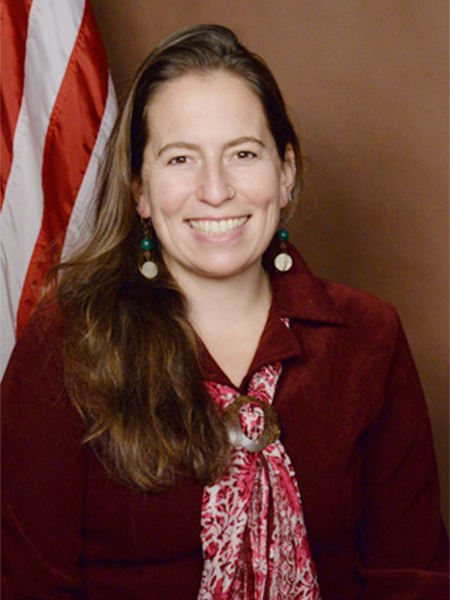Kallman, Kislak introduce bill to begin reducing carbon emissions from buildings
Change is necessary to meet net-zero commitment of Act on Climate
STATE HOUSE – When Rhode Island enacted the Act on Climate in 2021, the state committed to reducing its carbon emissions to net-zero by 2050.

MEGHAN E. KALLMAN
About 30% of those carbon emissions come from buildings, and Sen. Meghan E. Kallman and Rep. Rebecca Kislak have introduced legislation to transition the building sector toward meeting that commitment.
The Building Decarbonization Act of 2024 (2024-H 7617) would require large buildings to report their energy usage and emissions, set in motion a process of creating standards to reduce their emissions and phase in requirements that all new construction use only electricity for energy and heating.
“Addressing the energy use and emissions from buildings is a critical part of achieving our commitment to our climate. It’s also a monumental, slow-moving undertaking that we must begin now. Change of this magnitude will be a decades-long process, phased in and implemented as new buildings are built and old systems need replacement. We cannot afford to drag our feet on getting started, not only because of the time it will take, but because all of the intervening years will add to the emissions that are contributing to the warming of our planet and the resulting problems,” said Representative Kislak (D-Dist. 4, Providence).
Said Senator Kallman (D-Dist. 15, Pawtucket, Providence), “Our legislation lays the foundation for achieving decarbonization of our buildings. It’s a blueprint that starts with analysis of our biggest buildings, then the creation of standards and plans. It gradually phases in the changes that will need to be made, starting with new construction and ensuring that the realities of affordability are addressed. This is the road map for how we get to the net-zero future we need for buildings in Rhode Island, and we are excited to get to work on putting it in place.”
Under the legislation, the first steps toward decarbonizing Rhode Island’s existing buildings would be energy use reporting for the largest buildings. The bill would require the state’s largest buildings to report their energy usage and emissions to a central data repository such as ENERGY STAR Portfolio Manager, which is already used by nearly 500,000 buildings nationwide. The reporting requirement would apply to public buildings larger than 25,000 square feet beginning next year, private buildings greater than 50,000 square feet in 2026, and private buildings greater than 25,000 square feet in 2027.
That data will help the state develop future standards for emission reductions for large buildings, and awareness alone will help owners of the largest buildings reduce their energy consumption costs.
After three years of collecting the data, the state Office of Energy Resources would be required to create a building performance standard that sets long-term and interim energy and emissions targets. According to the Green Energy Consumers Alliance, doing so would add Rhode Island to the four other states, one county and seven municipalities that have already adopted such standards. Dozens more are in the development stage.

REBECCA KISLAK
To achieve decarbonization, the bill would phase in requirements that all new construction be all-electric. By Dec. 31, 2024, it would require that all permits for new public construction or alteration, including schools, be all electric, and that all permits for private construction or alteration include electrical capacity for retrofitting mixed-fuel buildings to all-electric in the future. It would also enable municipalities, if they choose, to require all new construction and alterations to be all-electric.
Effective Dec. 31, 2026, all new construction statewide would be required to be all-electric, with some exceptions for commercial or industrial use that cannot feasibly operate as such.
The bill includes provisions requiring that the Housing Resources Commission propose changes to ensure that production of affordable housing is not compromised and directing the Public Utilities Commission to address electricity affordability by establishing a percent-of-income payment plan for low- and moderate-income families in all-electric buildings and to examine innovative solution to address energy affordability in all-electric buildings.
The sponsors and supporters said the legislation is absolutely critical to achieving the commitment made in the Act on Climate to achieve net-zero emissions by 2050, and it also ties into wider efforts nationally and around the globe to drastically cut emissions. The Biden administration recently announced a goal of making zero-emission, resilient new construction and retrofits common practice by 2030.
“Rhode Island lacks a comprehensive policy to address emissions from the building sector. To adequately reduce emissions in line with the Act on Climate, we need to both retrofit existing buildings and ensure all new construction is all electric. Addressing existing buildings is the larger piece of the puzzle, as 70% of our building stock in 2050 is already in place today. In order to achieve net-zero by 2050, it’s crucial that we start retrofitting existing buildings now. The benchmarking and building performance standard will put us on track to do just that for large buildings. The phase-in of all electric new construction will ensure that we aren’t digging a deeper hole and making the problem worse,” said Amanda Barker, Rhode Island policy advocate at the Green Energy Consumers Alliance.
Emily Koo, senior policy advocate and Rhode Island program director of Acadia Center said, “The Building Decarbonization Act is an essential first step to transitioning our buildings away from fossil fuels in order to meet our state’s climate mandates. We cannot allow new buildings to lock in fossil fuel systems for decades to come. And by tracking energy usage and building performance, large public and private building owners can lower energy costs and chart a path toward investing in energy efficiency and electrification.”
